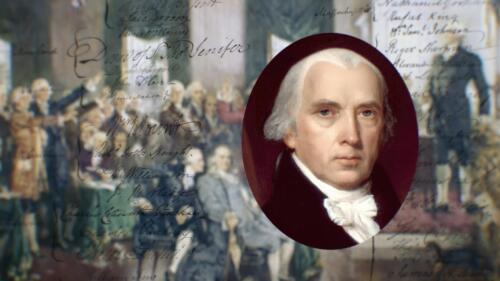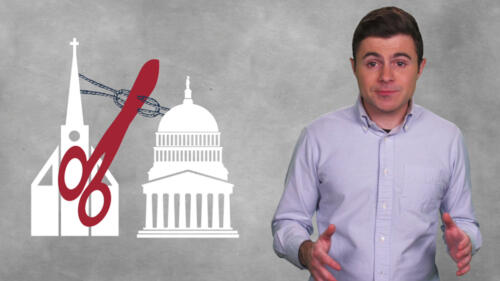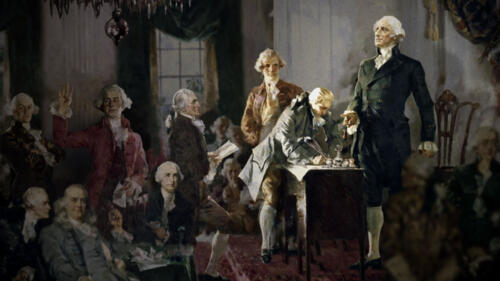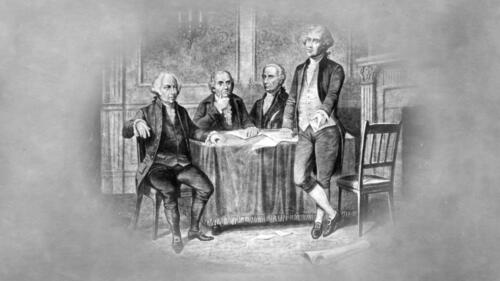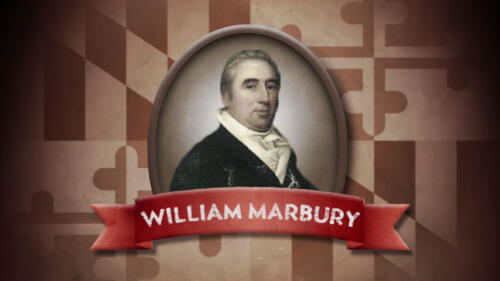U.S. Constitution
The U.S. Constitution, signed on September 17, 1787, created America’s federal government, establishing fundamental laws and legal structures while guaranteeing certain basic rights for American citizens.

Start Here

Since the Constitution was ratified in 1789, hundreds of thousands of bills have been introduced attempting to amend the nation's founding document. But only 27 amendments to the U.S. Constitution have been ratified, out of 33 passed by Congress and sent to the states. See summaries of all 27.

The constitutional framers may have viewed Indigenous people of the Iroquois Confederacy as inferior, but that didn't stop them from admiring their federalist principles.

The founding father worried that trying to spell out all of Americans' rights in the series of amendments could be inherently limiting.

Through amendments and legal rulings, the Constitution has transformed in some critical ways.
Freedom of Religion in the U.S.
Freedom of Religion in the U.S.
What is the history of the freedom of religion as outlined in the first amendment to the U.S. Constitution? How is this freedom enforced? How does religious policy manifest in the real world?
3 Key Amendments
Explore All Related Topics

According to the U.S. Constitution, states oversee federal elections, but Congress has the power to intervene.

The Constitution says the president must get paid, but Congress decides how much.

No constitutional limits existed for U.S. presidents until 1951.

James Madison wrote the amendment to assure that the newly drafted Constitution would not trample on states' or individuals' rights.

Flag burning has long tested the limits of freedom of speech.

Through amendments and legal rulings, the Constitution has transformed in some critical ways.

When cross-country travel by horse prevented senators from quickly convening, the Framers decided to allow the president to make temporary appointments.

John Adams said the right to a trial by jury, along with representative government, serve as "the heart and lungs of liberty."

Before Marshall became chief justice in 1801, the Supreme Court operated out of a borrowed room and wielded little authority.

Since the Constitution was ratified in 1789, hundreds of thousands of bills have been introduced attempting to amend the nation's founding document. But only 27 amendments to the U.S. Constitution have been ratified, out of 33 passed by Congress and sent to the states. See summaries of all 27.

The Third Amendment addressed colonists’ grievances with British soldiers, and has since played only a small role in legal cases.

When Aaron Burr set off to claim lands in the Southwest, President Thomas Jefferson intended to stop him.

Disputed returns and secret back-room negotiations put Republican Rutherford B. Hayes in the White House—and Democrats back in control of the South.

The Founding Fathers had just broken free from one empire, and the idea that foreign power could influence their young democracy was a prominent source of anxiety.

The 13th-century pact inspired the U.S. Founding Fathers as they wrote the documents that would shape the nation.

The founding father worried that trying to spell out all of Americans' rights in the series of amendments could be inherently limiting.

White House staff reportedly said that Reagan was inattentive and acting strangely, but his chief of staff dismissed the possibility of trying to remove him.

Under U.S. law, some essential rights of the 14th amendment belong not only to American citizens, but also corporations—thanks to a few key Supreme Court cases and a controversial legal concept known as corporate personhood.

BCRA Challenged In 2002, Congress passed the Bipartisan Campaign Reform Act (BCRA), widely known as the McCain-Feingold Act, after its original sponsors, Senators John McCain of Arizona and Russ Feingold of Wisconsin. In one of its key provisions, Secti...

Here’s how the U.S. came to put a cap on how long someone could hold the reins of the government.

Prior to the 25th Amendment, presidential succession procedures existed, but they were vague and didn’t cover every contingency.

Origins Of Free Press Before the thirteen colonies declared independence from Great Britain, the British government attempted to censor the American media by prohibiting newspapers from publishing unfavorable information and opinions. One of the first c...

Religion In Colonial America America wasn’t always a stronghold of religious freedom. More than half a century before the Pilgrims set sail in the Mayflower, French Protestants (called Huguenots) established a colony at Fort Caroline near modern-day Jac...

Freedom of speech—the right to express opinions without government restraint—is a democratic ideal that dates back to ancient Greece. In the United States, the First Amendment guarantees free speech, though the United States, like all modern democracies, places limits on this freedom.

The First Amendment to the U.S. Constitution protects the freedom of speech, religion and the press. It also protects the right to peaceful protest and to petition the government.

The Second Amendment, ratified in 1791, is one of 10 amendments that form the Bill of Rights. It establishes the right to bear arms and figures prominently in the long-running debate over gun control.

It was first proposed in 1789, but it took 200 years and a campaign by a Texas university student before it was finally ratified.

Debate over the system used to choose the president and vice president of the United States is as old as the U.S. Constitution itself.

The first 10 amendments to the U.S. Constitution, known collectively as the Bill of Rights, became law on December 15, 1791.

“You have the right to remain silent.” You’ve probably heard those words, which are part of the Miranda warning, on countless TV shows following a criminal suspect’s arrest. Thanks to a 1966 landmark ruling by the U.S. Supreme Court in the case of Miranda v. Arizona, the warning—which also lets a person know that anything […]

Seven surprising facts about the framers and the Constitutional Convention.

The 26th Amendment: “Old Enough to Fight, Old Enough to Vote” During World War II, President Franklin D. Roosevelt lowered the minimum age for the military draft age to 18, at a time when the minimum voting age (as determined by the individual states) h...

The ratification of the 18th Amendment to the U.S. Constitution–which banned the manufacture, transportation and sale of intoxicating liquors–ushered in a 13-year period in American history known as Prohibition.

The 1803 United States court case between William Marbury and James Madison (Marbury v. Madison) established that U.S. courts hold the power to strike down laws, statutes and some government actions that are deemed unconstitutional.

The Crime The crime in question occurred in March 1963 when an 18-year-old girl was forcibly grabbed by a man as she was walking home from her bus stop after working late at a movie house in Phoenix, Arizona. The attacker dragged her into his car, tied ...

McCulloch v. Maryland was a landmark Supreme Court case from 1819. The court’s ruling asserted national supremacy over state authority.

The Preamble to the U.S. Constitution The Preamble outlines the Constitution's purpose and guiding principles. It reads: The Bill of Rights were 10 amendments guaranteeing basic individual protections, such as freedom of speech and religion, that became...

The Bill of Rights—the first ten amendments to the U.S. Constitution protecting the rights of U.S. citizens—were ratified on December 15, 1791.
